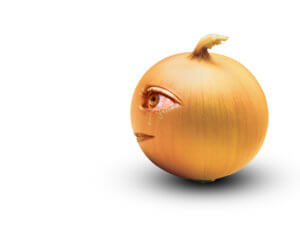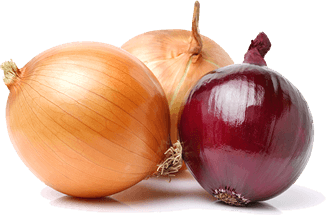Frequently Asked Questions
From cutting an onion to storing onions and everything in-between, these are some of the most commonly asked questions (FAQs).
Q: How can I reduce tearing when cutting an onion?

A: To reduce tearing when cutting onions, first chill the onions for 30 minutes. Then, cut off the top and peel the outer layers leaving the root end intact. (The root end has the highest concentration of sulphuric compounds that make your eyes tear.)
Q: How many cups of chopped onion will one medium onion yield?
A: One medium onion equals about 1 cup chopped onion.
Learn how to cut an onion here
Q: What is the best way to store onions?
A: Dry bulb onions should be kept in a cool, dry, well ventilated place. Do not store whole onions in plastic bags. Lack of air movement will reduce their storage life. Sweet onions have a higher water content than storage onions, making them more susceptible to bruising, and a shorter shelf life than storage varieties. One way to extend the shelf life of a sweet or high water content onion is to wrap each one in paper towels or newspaper and place them in the refrigerator to keep them cool and dry.
Best practices to store onions here
Q: How do I store whole peeled onions?
A: Whole peeled onions should be properly refrigerated at 40°F or below. (Source: USDA)
Q: After I cut or use part of an onion, how long will it keep?
A: Chopped or sliced onions can be stored in a sealed container in your refrigerator at the proper temperature of 40°F or below for 7 to 10 days (Source: USDA). For pre-cut fresh or frozen products, always use and follow manufactures “use by” dates.
Q: Why do my onions taste bitter after sautéing?
A: High heat makes onions bitter. When sautéing onions, always use low or medium heat.
Q: I am worried about having “onion breath.” Is there anything I can do to alleviate this situation?
A: Although onion breath normally comes from eating raw onions, a mild raw onion may cause no odor. Cooked onions leave virtually no odor on the breath. When you are concerned about your breath, use these helpful tips to freshen your breath.
- Eat a sprig or two of parsley; it’s known as nature’s natural breath sweetener.
- Rinse your mouth with equal parts of lemon juice and water.
- Chew a citrus peel.
Q: How do I remove the smell of onions from my hands and/or cooking equipment?
A: Rub your hands or cooking equipment with lemon juice. If your pots or pans are made of aluminum, cast iron, or carbon-steel, rub them with salt instead.
Want to learn some other great uses for onions? Go here.
Q: What should I look for when purchasing onions?
A: When purchasing onions, look for dry outer skins free of spots or blemishes. The onion should be heavy for its size with no scent.
Q: I want to use raw onion. How can I reduce the pungency?
A: To reduce the pungency, sharpness or aftertaste of a raw onion, cut them the way you plan to use them and place into a bowl of ice water to stand for 1 1/2 hours before draining. If time is at a premium, place onions in a strainer or sieve. Run water through onions for at least a minute.
Q: Which color of onion (yellow, red, or white) should I use and does each color taste different
A: Refer to the Color, Flavor, Usage Guide for a chart to help you choose which onion to use in a recipe.
Q: Are onions healthy?
A: Yes. Onions are high in vitamin C and are a good source of fiber and other key nutrients. Onions are fat free and low in calories, yet add abundant flavor to a wide variety of foods.




